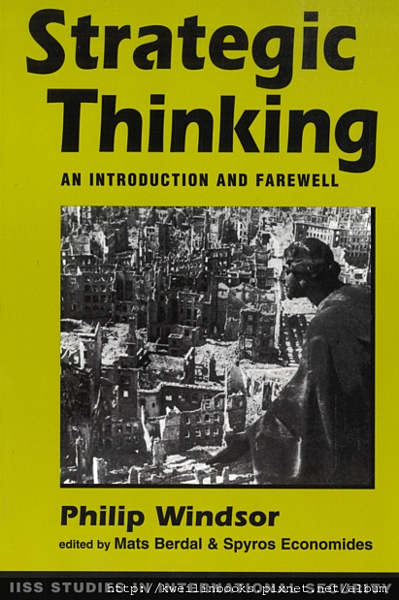Strategic Thinking: An Introduction and Farewell (Iiss Studies in International Security)
溯戰略思想從中歐起源到冷戰滅亡的演變,認為戰略在核時代具有的獨特性和自主性。溫莎關心的是我們對戰爭和戰略理解的變化 - 他認為,技術革新本身的影響要小於技術,社會和政治變革的綜合影響。這個過程在核時代達到高潮,戰略思想變成“自我指涉和自我合法化”,戰略考慮成為“國家和集團政治的決定性力量”。這本書論述了溫莎在整個學術生涯中的許多主題,他在這些主題的反思中滲透了蘇聯的戰略思想,軍備控制,聯盟的作用,游擊現像以及核威懾的合理性和道德規範。最後一章探討了冷戰結束對未來戰略研究的意義。
Here, Philip Windsor explores the emergence, meaning, and significance of the Cold War mentality. Tracing the evolution of strategic thinking from its origins in medieval Europe to the demise of the Cold War, he considers the peculiar character and autonomy that strategy acquired in the nuclear age. Windsor is concerned with changes in our understanding of war and strategy - changes, he argues, that resulted less from technological innovation per se than from the combined effects of technological, social, and political transformations. This process culminated in the nuclear age, when strategic thinking became "self-referring and self-legitimating" and strategic considerations emerged as "the decisive force in the conduct of the politics of states and blocs". The book addresses many of the themes that preoccupied Windsor throughout his academic career and on which his reflections threw such penetrating light: Soviet strategic thought, arms control, the role of alliances, the guerilla phenomenon, and the rationality and ethics of nuclear deterrence. The final chapter explores the implications of the end of the Cold War for the future of strategic studies.
Philip Windsor (Autor)
Publisher: Lynne Rienner Pub
ISBN: 978-1588260246
原價 US:19.95 NT$:670 ||PIXNET_ARTICLE_TAGS||痞市集,圖書╱雜誌



 留言列表
留言列表


 {{ article.title }}
{{ article.title }}